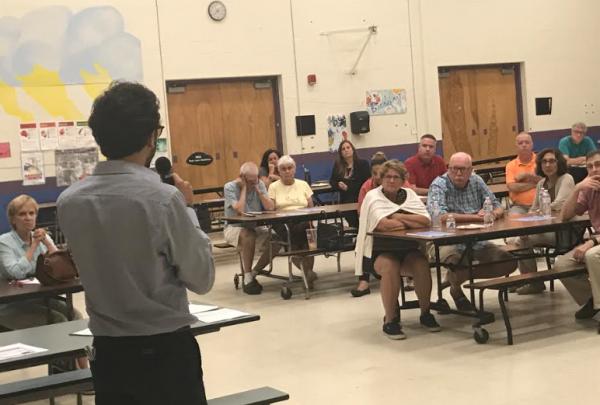September 27, 2017

Professor Antonio Raciti, an architectural engineer and Assistant Professor of Ecological Design at UMass Boston, addressed the Pope’s Hill Neighborhood Association on Wednesday evening.
Graduate students, residents, and experienced urban planners will join forces this fall to enact a development plan for Dorchester’s Pope’s Hill neighborhood. The plan will be developed by faculty and students from the University of Massachusetts Boston’s department of Urban Planning and Community Development. The Pope’s Hill Neighborhood Association (PHNA) will guide the UMass team throughout the planning process, affording planners with direct resident input.
Two UMB professors will lead the planning initiative. Kenneth Reardon is the director of the Urban Planning and Community Development Master of Science Program. Antonio Raciti, an architectural engineer and Assistant Professor of Ecological Design, will supervise 30 students as they work with Pope’s Hill residents and address issues.
“Academic research shows that economic and community development in urban communities has the greatest likelihood of being successful when led by one or more local champions,” Reardon explained. “The PHNA has earned a well-deserved reputation among local residents and leaders for successfully addressing important housing, traffic, recreation, and public safety issues. We feel very fortunate to have them as our key community partner.”
Phil Carver, a Pope’s Hill resident and director of Community relations at UMass Boston, introduced Reardon, Raciti, and the graduate students to the leaders of the PHNA last spring. The planning studio is the graduate students’ culminating project, an opportunity for students to integrate coursework, life experiences, professional training, and prior planning experience into a real-word urban development plan. Students will apply their inter-disciplinary education toward economic growth, affordable housing, and small business development in Pope’s Hill.
By partnering with UMB, the PNHA will develop and grow the neighborhood with the help of experienced professionals.
“Their history of mobilizing local residents, business owners, and elected officials to address critical neighborhood problems is impressive,” Reardon said. “Both Professor Raciti and I have long histories of working with community-based organizations on ‘bottom-up’ planning processes that take advantage of the knowledge, commitment, and passion of local residents and leaders for positive change in their neighborhoods and city.”
The UMass team has three goals for the Pope’s Hill planning studio. First, the team is committed to developing a blueprint that constructively and creatively addresses the concerns of local stakeholders. They will consider existing neighborhood conditions and future development possibilities.
“We are engaging PHNA and other neighborhood organizations in identifying the issues to be addressed, their preferred development scenario to be pursued, and the specific strategies to be employed to further improve an already impressive historic Boston neighborhood,” Reardon said.
Second, the team hopes to engage more local residents and business owners in community problem-solving and development. Third, the UMass team is dedicated to training future planners to work with local residents, institutional leaders, and elected officials in a highly respectful and cooperative manner.
Right now, the team is in the first phase of a resident-led planning process.
“[W]e are carefully examining the rich history of this important Boston neighborhood, interviewing local leaders such as school principals, business owners, religious leaders, and elected officials as well as neighborhood residents through a door-to-door interviewing process to identify what they perceive to be Pope’s Hill’s most important assets and challenges,” Reardon said.
In order to reach as many residents as possible, UMass has participated in outreach activities with local residents, institutions, businesses, and municipal agencies serving the neighborhood. Throughout the summer and fall, students traveled throughout the neighborhood, knocking on doors to find out what residents wanted and need.
“The reaction has been very positive,” Reardon said. “In fact, the majority of residents whose doors we have knocked on have invited us into their homes and spent forty-five minutes or longer to share their perceptions of existing neighborhood conditions as well as their hopes for the future.”
Throughout the fall, the UMass team will work with local stakeholders to identify and define what issues the community is most committed to address. This process will be completed by the Thanksgiving Holiday. By St. Patrick’s Day, the team will have a detailed plan to address the issues.
“The overwhelming majority of those we have spoken to love Pope’s Hill and are eager to work with their neighbors and local officials to further improve its quality of life. Several see this effort as the logical “next step” towards implementing the goals of Mayor Walsh’s recently completed Boston 2030 Plan,” said Reardon.
Villages:
Topics:


